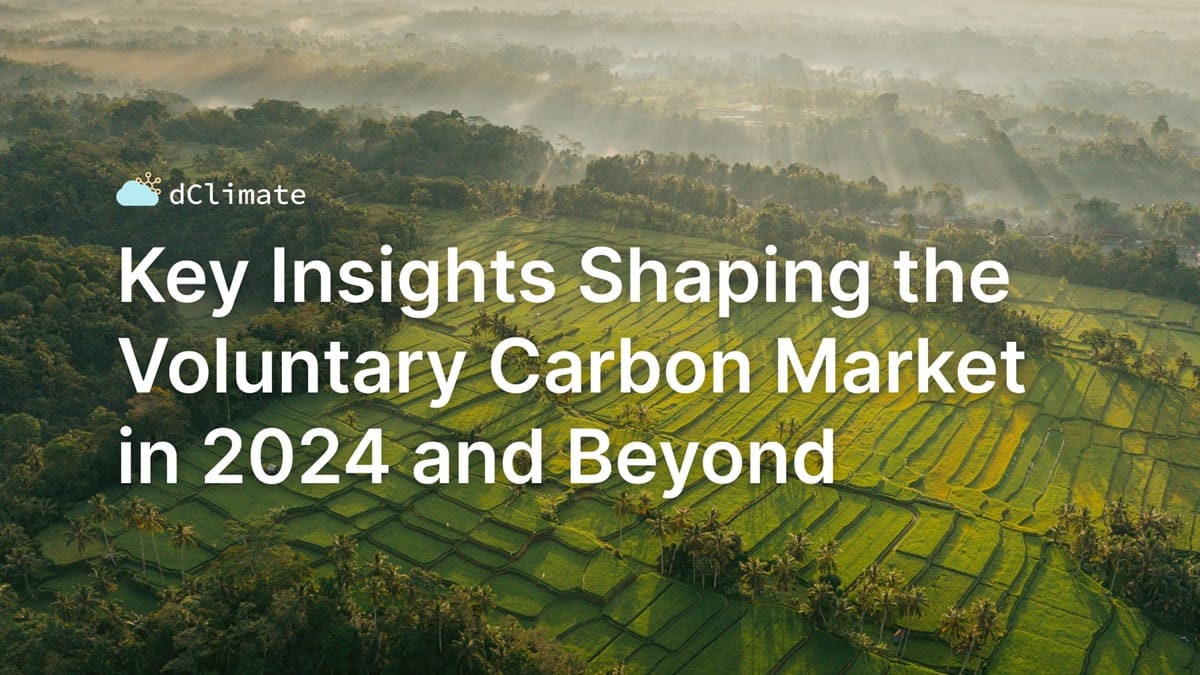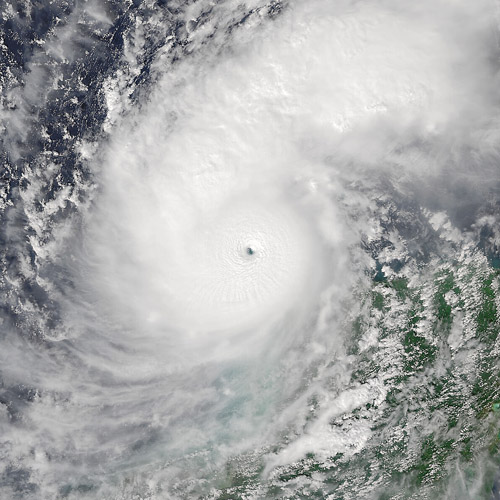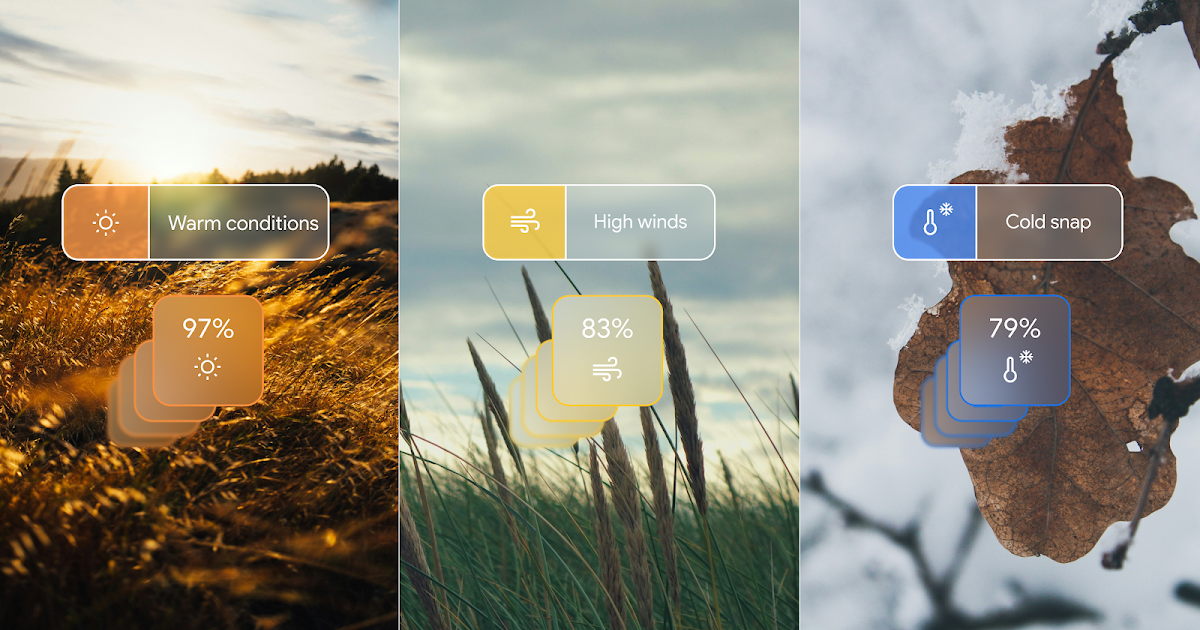Data ReFined #46: Key Insights Shaping the Voluntary Carbon Market in 2024 and Beyond

⛅ Data ReFined is dClimate's biweekly newsletter, delivering insights at the intersection of the voluntary carbon market (VCM), digital MRV technologies, climate risk management, and climate intelligence.
In this edition:
Carbon Finance & Digital MRV
🌳 The State of the Voluntary Carbon Market 2024
🌳 The Implications of COP29 Agreements on Global Carbon Markets
🌳 How Tokenizing Nature Can Bring a New Economic Paradigm
Climate Risk Management
🛡️ Arbol Finalizes $20M Hurricane Milton Payouts in Weeks
🛡️ WEF's Guide for CEOs on Managing Corporate Climate Risks
🛡️ A Visual Look at the Rising U.S. Insurance Costs Fueled by Climate Risks
🛡️ ECB and EIOPA Join Forces to Reduce Financial Impact of Natural Disasters
Climate Data & Intelligence
🌎 Next-Gen Weather Forecasting with Google's AI-based Climate Models
🌎 Global Monitoring of Vegetation Disturbances in Near Real-Time
🌎 ESA's Sentinel-1C Satellite Transmits First Radar Images
Scroll down for our summaries of this news! 👇
Subscribe here and join over 4000+ readers!

The State of the Voluntary Carbon Market 2024
Fastmarkets published a data-rich overview of the voluntary carbon market, highlighting its steady growth despite recent scrutiny over project integrity and quality. Carbon credit retirements rose from 31 million tCO2e in 2016 to a record 163 million in 2023, with 2024 showing further growth.

The Implications of COP29 Agreements on Global Carbon Markets
At COP29 in Baku, countries finalized crucial rules for international carbon trading under Article 6 of the Paris Agreement. Mark Kenber, Executive Director of the Voluntary Carbon Markets Integrity Initiative, discusses the implications in a recent episode of the ESG Insider podcast. Listen here
In related news, Gabriel Labbate, head of UNEP’s Climate Mediation Unit, recently shared insights on the newly adopted carbon market framework and its promising potential for Africa.
How Tokenizing Nature Can Bring a New Economic Paradigm
Tokenizing natural assets can incentivize conservation and regeneration, creating data-backed markets for environmental value. A recent article by Michael Kelly, co-founder of Open Forest Protocol, envisions a future where blockchain technology integrates natural capital into economic systems, aligning nature's long-term benefits with modern finance's short-term focus. Read more

Arbol Finalizes $20M Hurricane Milton Payouts in Weeks
Arbol, a global climate risk solutions platform, has demonstrated the efficiency of parametric reinsurance by delivering nearly $20 million in payouts within 30 days following Hurricane Milton's landfall in Florida. This rapid disbursement contrasts with traditional reinsurance processes, which can take several months.
Find more details here:

WEF's Guide for CEOs on Managing Corporate Climate Risks
A new report from the World Economic Forum highlights how climate-related risks, such as extreme weather and rising carbon pricing, are reshaping markets and business models. The guide emphasizes the urgency for CEOs to address these risks, showcasing opportunities in the $14 trillion green economy. Read more
A Visual Look at the Rising U.S. Insurance Costs Fueled by Climate Risks
A recent article in The Guardian highlights the significant impact of climate change on home insurance premiums across the United States. Research indicates that counties with the highest climate-driven disaster risks have experienced a 22% increase in home insurance premiums over the past three years, compared to a 13% rise nationwide. Read more
On the same topic, the Senate Budget Committee published a public dataset and accompanying report, showing the extent of the climate-driven crisis in homeowners' insurance.
ECB and EIOPA Join Forces to Reduce Financial Impact of Natural Disasters
The European Central Bank and the European Insurance and Occupational Pensions Authority have proposed a unified approach to mitigate the economic impact of natural disasters. This initiative aims to integrate risk management practices into Europe’s financial system, promoting more effective responses to climate-related challenges. Read more

Next-Generation Weather Forecasting with Google's AI-Based Climate Models
DeepMind's new AI model, GenCast, enhances weather forecasting by predicting conditions and extreme events with higher accuracy than current systems. Trained on decades of historical data, GenCast outperforms existing systems, enabling decision-makers to prepare more effectively for climate-related risks.
Read the full article:

Global Monitoring of Vegetation Disturbances in Near Real-Time
Global Forest Watch has launched DIST-ALERT, a near-real-time alert system for monitoring vegetation disturbances globally, including deforestation and changes in grasslands, wetlands, and crops. Using high-resolution satellite data, it provides updates every 2–4 days, enabling timely and reliable insights for proactive environmental management. Read more
ESA's Sentinel-1C Satellite Transmits First Radar Images
Less than a week after its launch on December 5, 2024, the Copernicus Sentinel-1C satellite has transmitted its first images. The satellite's advanced radar delivers high-resolution data on soil moisture and crop health, supporting sustainable agriculture. Read more
Thank You For Reading Our Newsletter! 💙
We greatly appreciate your interest and support! If you enjoyed this newsletter, please consider forwarding it to your network to increase awareness of these critical climate topics.
About dClimate
dClimate’s decentralized and open climate data infrastructure powers a wide range of applications, including climate risk assessments, parametric insurance, and climate intelligence platforms for carbon and commodity markets.
⛅ Visit our website | 📊 Discover our products
Join the dClimate Community!
We welcome your comments, feedback, and likes. Follow us on the channels below to stay updated and start building in our decentralized climate data ecosystem. 👇




